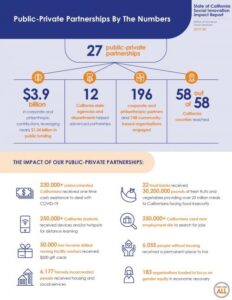Ahead of Thanksgiving, Governor Gavin Newsom today issued the state’s first-ever Social Innovation Impact Report highlighting innovative public-private-partnerships that have contributed $3.9 billion toward the state’s housing efforts, COVID-19 response and more. As part of the state’s leading-edge social innovation work, California engaged 196 corporate and philanthropic partners and 748 community-based organizations, benefitting each of the state’s 58 counties.
“California is home to dreamers and doers who rise to every challenge with creativity and resolve,” said Governor Newsom. “It’s in that spirit and in the spirit of a California for All that we called on businesses and foundations to step up for communities in need – and they did just that. Through our public-private partnerships, we raised $3.9 billion which has been instrumental in building affordable housing, strengthening our state’s COVID-19 response and more. From aiding struggling undocumented Californians to supporting wraparound services through Homekey, our social innovation work has shown what’s possible when we work together to help each other out.”
A copy of the report can be found here.

Disaster Resilience Assistance for Immigrants
When the federal government issued stimulus checks of up to $1,200 to each American, they left out undocumented Americans, who are disproportionately performing essential jobs throughout the COVID-19 crisis. In April of this year, Governor Newsom announced an unprecedented $125 million in disaster relief assistance to fill this gap and provide financial support to undocumented Californians impacted by COVID-19 – $50 million of which came from philanthropy.
Homekey – Housing for Individuals Experiencing Homelessness
California’s homelessness crisis has been decades in the making, affecting communities throughout the state – rural and urban, inland and coastal. The Governor’s commitment to addressing homelessness took on a new urgency amid the COVID-19 pandemic, with the virus posing particular danger to our unsheltered neighbors. Building on Project Roomkey, a first-in-the-nation program to temporarily house Californians experiencing homelessness, the Governor announced Homekey, which is designed to convert thousands of hotels, motels, vacant apartments and other buildings to permanent housing. The program, a collaboration of government of all levels and partners in philanthropy, also provides supportive services to Californians who get housing, including job training, substance abuse counseling and more, to help end the cycle of homelessness and help them back on their feet. Philanthropy contributed $46 million to support wraparound services for Homekey units.
Farm to Family
In a state as prosperous as California, no one should go hungry. The COVID-19 pandemic exacerbated persistent hunger in our state. As much of the nation shut down at the start of the pandemic, California farmers were faced with millions of pounds of food they could not sell, while many Californians were experiencing unprecedented hunger due to the economic downturn and widespread job losses. In response, the California Department of Food and Agriculture and the California Association of Food Banks forged an innovative partnership to expand the Farm to Family program, which pays farmers a pick and pack fee to donate produce to food banks. As a result, healthy food is provided to Californians in need, and more farmworkers stay employed. Philanthropy raised $2.75 million to support this effort.
Philanthropic Funding by Issue Area
- $3.57 billion – Housing/Homelessness
- $186,240,654 – COVID-19 Response
- $50,000,000 – Immigrant Assistance
- $15,000,000 – Criminal Justice
- $4,500,000 – Domestic Violence
- $31,000,000 – Education
- $31,500,000 – Jobs and the Economy
Impact by the Numbers:
- 230,000+ undocumented Californians received one-time cash assistance to deal with COVID-19
- 250,000+ California students received devices and/or hotspots for distance learning
- 50,000 low-income skilled nursing facility workers received $500 gift cards
- 6,177 formerly incarcerated people received housing and social services
- 22 food banks received 30,200,000 pounds of fresh fruits and vegetables, providing 25,166,667 meals to Californians facing food insecurity
- 250,000+ Californians used a new employment site to search for jobs
- 6,055 people without housing received a permanent place to live
- 183 organizations were funded to focus on gender equity in economic recovery

Is there any chance I could get housing assistance for my family of 4 .three kids and 1 adult. At this time we are homeless and have no one to turn to .my parents are old and unable to afford to help me and I’m not able to stay with them much longer.